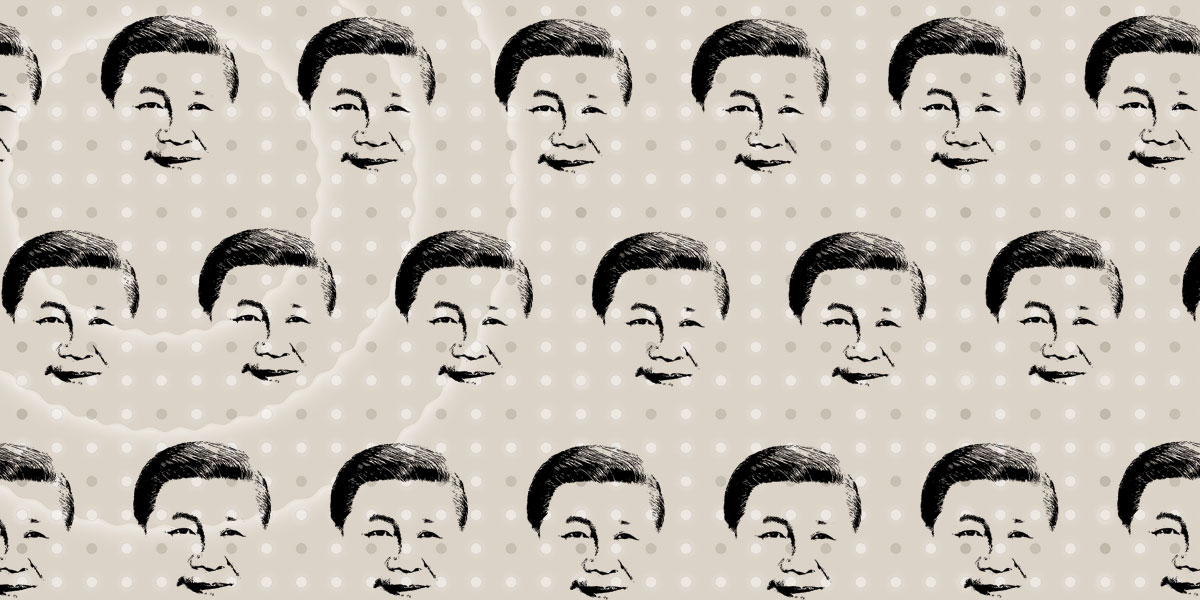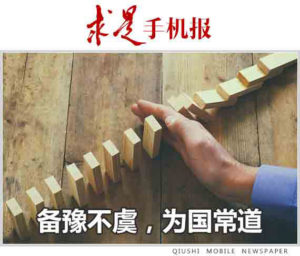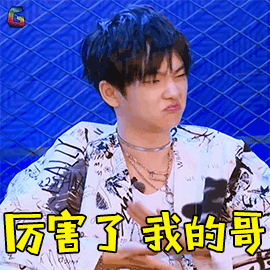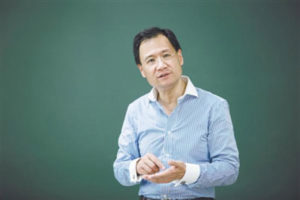
‘Chairman of Everything’ Xi Jinping
Source: Wikipedia
ON 2 MARCH 2018, Amazing China 厉害了, 我的国 — a ninety-minute, state-funded documentary film — opened in movie theatres across China. The film begins with footage of Xi Jinping from a press conference on 15 November 2012, when he had just been appointed as the Chinese Communist Party’s (CCP) General Secretary. To the accompaniment of a rousing symphonic score, we see Xi promising, on behalf of his fellow-Politburo members, ‘to attend to our duties day and night with diligence, and strive to deliver a satisfactory answer sheet to history and the people’. As the music builds, the film cuts to a scene of children playing outdoors, followed by images of a mother and her young son, smiling as they give a thumbs-up sign with both hands, then individual smiling workers, and then a group of happy students waving with their hands raised, each making a peace sign, as the narrator intones: ‘Five years have passed. More than 1.3 billion Chinese citizens have received an answer sheet of this kind.’
The remainder of the film is devoted to showcasing the nation’s many major achievements since Xi took power. It focusses on high-tech industries such as China’s 5G mobile technology, the deep-water drilling rig Blue Whale 2, and the construction in Guizhou of the Five-hundred-Metre Aperture Spherical Radio Telescope (known as FAST), the rig and telescope being the largest of their kind in the world. Amazing China, with its dazzling images, high-definition graphics, and high-quality sound, reflects the sophistication of Party propaganda under Xi. It was no accident that the release of this celebratory film coincided with the annual gathering in Beijing of delegates to the National People’s Congress (NPC) and the Chinese People’s Political Consultative Conference (CPPCC). Known colloquially as the Two Sessions 两会, these meetings of China’s legislature (the NPC) and the Party’s highest advisory body (the CPPCC) ran from 3 to 20 March.
A week into the Two Sessions, on 9 March, Xinhua reported that Amazing China had become China’s ‘all-time highest-grossing documentary’. Other state media sources also praised the film. The national broadcaster CCTV reported on 11 March that the film had generated ‘a tide of favourable comments by people from all walks of life and delegates to the Two Sessions’. Yet, in mid-April, the Party’s Central Propaganda Department issued instructions for theatre screenings and online distribution of the film to cease.
State censorship ensured that, at least within China, speculations about this unexplained about-face did not circulate widely. Outside China, however, online commentators linked the film’s withdrawal to the onset of the US–China ‘trade war’, following the imposition of the first US tariffs on a range of Chinese products in late March. Several of these commentators singled out the ban that the US Commerce Department had imposed on Chinese telecom company ZTE on 16 April, preventing ZTE from buying essential components and software from its US suppliers. (This ban was lifted on 7 June).
Amazing China presents ZTE (founded in 1985 and formerly known as Zhongxing Telecommunication Engineering Corporation) as a shining example of the nation’s technological prowess. The US ban, by contrast, revealed the extent of ZTE’s reliance on US-made technology. On 17 April, one day after the ban was imposed, ZTE announced it had ceased ‘major operating activities’. Trading in the company’s shares was suspended and the resulting loss of investor confidence, together with growing uncertainty about China’s trade relations with the US, affected the development plans of two other major Chinese telecom companies — Huawei and Xiaomi. On the Q&A platform Pin-cong 品葱, one commentator wrote that the problem with ZTE’s prominence in the film was that ‘while people may be indifferent to politics, they care greatly about their hard-earned money’. This commentator averred that the film was pulled for the following reason: if people who were already ‘angry and anxious’ because ZTE’s misfortunes had caused them to lose money were to watch ZTE being lauded in Amazing China, ‘their indifference would likely turn into an angry political reaction’.
In an interview with Voice of America’s Chinese-language service on 23 April, the Beijing-based social critic and historian Zhang Lifan 章立凡 observed that news of the film’s withdrawal might have been overstated as he was still able to access it online. However, what was indisputable was that ‘the film has not ceased to be parodied and pilloried’.
Amazing China is a loose translation. The film’s Chinese title, Lihai le, wode guo 厉害了, 我的国, means ‘How formidable you’ve become, my country’. Zhang noted that wise-cracking netizens had offered the similar-sounding alternative title, Ni hai le wode guo 你害了我的国, meaning ‘You’ve destroyed my country’. Zhang said, ‘Naturally, those who have done the destroying know who they are’.
The film’s Chinese title is a riff on the online expression, lihai le, wode ge 厉害了,我的哥, meaning ‘You’re the best, bro’ and used by Chinese-speaking gamers to commend an extraordinary or unbeatable player. However, the word lihai 厉害 has ambivalent connotations. Depending on context, lihai can mean that a person is ‘highly capable’, even ‘formidable’, or alternatively ‘harsh’, ‘severe’, or ‘ruthless’. When lihai is used to describe an incident, situation, or natural phenomenon (for instance, a fight or a storm), an alcoholic beverage or personal experience (such as of hunger or grief), it highlights the extreme nature or intensity of the thing in question.
The ambivalence of lihai owes to the second character, hai 害, which carries a range of negative connotations. Used as a noun, hai means ‘evil’, ‘disaster’, or ‘trouble’, and, as a verb, it means to ‘destroy’, ‘endanger’, ‘injure’, or ‘kill’. The alternative title Zhang mentioned, Ni hai le wode guo, plays on these connotations of hai. Similarly, the gamers’ expression can also be used sardonically to mean, ‘So you think you’re the best, bro?’ In changing wode ge 我的哥 (my brother) to wode guo 我的国 (my country), the film’s producers evidently did not consider the parodic potential of their chosen title.
‘Being Prepared for All Contingencies’
An alertness to power as double-edged is implicit in the word lihai. People who rise to power quickly are described as lihai. People who are lihai are wary of rivals who may be equally or even more lihai than them. When Xi Jinping addressed senior Communist Party officials on 5 January 2018, the first day of a four-day workshop on ‘Studying and Implementing the Spirit of the Nineteenth National Party Congress’ in Beijing, he urged his audience to be vigilant against unforeseen dangers. Xi did not use lihai to describe China’s economic might. Instead, he spoke more circumspectly of China having arrived at ‘a time of great promise and historic opportunity’ in which ‘the overall situation for its further development is good but one cannot expect plain sailing as we move forward’. Xi elaborated:
The greater our achievements are, the more cautious we must become, as if we were walking on thin ice, and the more prepared we must be for danger. We absolutely cannot afford to make strategic mistakes or allow disruptions to occur. We face a volatile international situation and find ourselves in complex and sensitive surroundings as we shoulder the arduous and demanding responsibility of ensuring stable reform and development. We must thus pre-empt risks and have masterful ways at our disposal for dealing with and resolving risks and challenges … . We must continue to advance our great struggle, which has acquired many new historical characteristics, and be prepared to overcome all difficulties and obstacles. We will go forward boldly, guided by the noble goals that our Party has established.

Graphic illustration of ‘Make it the normal practice of our state to be prepared for all contingencies’ 备豫不虞, 为国常道 by the Party’s Qiushi magazine
Source: qstheory.cn
Xi used an eight-character premodern expression to sum up what he meant: ‘Make it the normal practice of our state to be prepared for all contingencies’ 备豫不虞, 为国常道. This quotation, taken from a Tang-era book on statecraft by the scholar-official Wu Jing 吴兢 (670–749) titled Essentials of the Good Government of the Zhenguan Era 贞观政要, quickly became a key Party slogan. It soon appeared in dozens of articles in China’s state-run media.
Chinese historians have traditionally and to this day represented the Zhenguan 贞观 era (627–649) of the second Tang emperor Taizong’s reign (r. 626–649) as a ‘prosperous age’ 盛世 in which people enjoyed an abundance of food; trade and cultural activities flourished; and the empire was at peace. The expression ‘governance during Zhenguan’ 贞观之治 is synonymous with ‘good government’. By quoting from Essentials of the Good Government of the Zhenguan Era, Xi Jinping is implicitly comparing his newly declared New Era 新时代 to that of the Zhenguan era. Endymion Wilkinson describes this Tang-era classic on statecraft as:
A collection of anecdotes and conversations between the emperor and his ministers that gives an idealised picture of government at a crucial moment in the establishment of Tang power … . During the Yuan and Qing, emperors received lectures on it as part of their education and the same was true of the rulers of Japan, Korea, and other nearby kingdoms until the early twentieth century.
Among those who lauded Xi’s use of this Tang dynasty expression was Yang Chaoming 杨朝明, Director of the Confucius Research Institute of China in Qufu, Shandong province — the birthplace of Confucius. Twelve days after Xi’s speech, Yang published an essay-length exegesis in the leading Party newspaper of ideas, Guangming Daily, in which he explained the meanings of the eight characters and their origins in early Chinese texts. He noted that the appearance of the second character 豫 yu (preparedness) as a hexagram in the nearly three-thousand-year-old Chinese classic, the Book of Changes 易经, indicates that the Chinese have always valued the idea of being prepared and that it is thus an enduring Chinese trait. As Yang puts it:
‘Being prepared for all contingencies’ is hence a kind of spirit and an ability. From [the time of the legendary sage rulers] Yao and Shun to the present, successive generations of Chinese have paid attention to ‘reverence’. In statecraft, one is required to ‘revere virtue to protect the people’. Individuals must have the mettle to make something of their lives and constantly seek to strengthen themselves. All these exemplify what ‘being prepared’ [备豫] means.
Accentuate the Positive
The increasingly severe tariffs that US President Donald Trump’s administration imposed on China from March onwards presented an enormous challenge for Xi and his administration. Because the value of Chinese exports to the US are more than quadruple that of US exports to China, the Chinese government is constrained in its ability to resolve the problems caused by the tariffs. Nonetheless, it has the power to block its citizens’ access to bad news concerning the tariffs and rising tensions between China and the US. By June 2018, the Party’s Central Propaganda Department (CPD) had formulated a strategy both for shaping mainland media coverage of the trade war and suppressing what it perceived as unfavourable international media reports.
On 29 June, the CPD issued a set of instructions to mainland media outlets requiring them to strictly follow the government’s lead in reporting. The media are to echo the statements made by Vice Premier Liu He 刘鹤, China’s chief trade negotiator. They must present the US as waging ‘a war against China’s rise’. As the outcome of this trade war depends on ‘which one holds out to the end,’ the CPD instructed, ‘we absolutely must not show any hesitation or softness’ 看谁能坚持到底,绝不能手软嘴软. Moreover, the media ‘must not attack Trump’s vulgarity, so as to avoid starting a war of insults’. The Department also issued two general directives:
Economic achievements and new developments must be given prominence. This will show that our economy has improved at a steady pace as planned. Place important economic reports on prominent pages. Timing is of the essence. Interviews must be sought from academic experts who have been recommended by the various departments. Information published on websites, Weibo and WeChat accounts must be well coordinated so that we present a picture of strength in our online propaganda.
Above all, do not mention ‘Made in China 2025’. There will be consequences if you do.
This injunction against ‘Made in China 2025’ was consistent with the withdrawal of Amazing China. The Made in China 2025 initiative had been introduced to develop precisely the same varieties of Chinese high-tech manufacturing that the film had praised Xi’s administration for having achieved ‘amazingly’ quickly. Launched by Premier Li Keqiang in 2015, Made in China 2025 is an ambitious ten-year plan to turn China into a global leader in information technology; robotics; the production of aerospace, aeronautical, agricultural, maritime, and new-energy equipment; and ‘green’ cars as well as nanomaterials, biopharmaceuticals, and new medical products.
The economic setbacks caused by incremental US tariffs on Chinese goods, coupled with growing international concern over China’s coercive influence abroad, including interference in other countries’ domestic politics, have, evidently, led Party leaders and senior propaganda officials to tone down talk of Chinese might and technological prowess. They are also aware that in the digital age their ability to suppress inconvenient information is relatively limited. The CPD’s directives (including the one of 29 June mentioned earlier) are regularly leaked and published on the US-based website China Digital News, in Chinese and English translation. Readers outside China can easily find out what is being blocked in China at any given time. Within China, however, censorship, together with the threat of penalties, has proven sufficiently effective in coercing media to comply with the CPD’s directives.
Unlike a multi-party democratic system where, ideally, policy and law are shaped by contestation and cooperation among the elected representatives of rival political parties, China’s one-Party system operates on the presumption that the Party knows best what the people need. Censorship and propaganda have, thus, always remained essential tools of social and political control for the CCP. While censorship prevents open challenges to the Party’s policies and actions, propaganda inducts people into how the Party wants them to think.
A September 2018 study by Damien Ma and Neil Thomas of recent propaganda work under Xi indicates that it has intensified such that ‘there will be less internal debate over the interpretation of high-level directives, less bureaucratic resistance to central policy preferences, and easier recourse to shut down publications and silence troublemakers’. Ma and Thomas highlight an important difference between Xi’s approach to propaganda and that of Hu Jintao and Jiang Zemin. Whereas his predecessors had allowed some local decision-making by state agencies on cultural and media matters, Xi has concentrated these decision-making powers in the CPD.
From the start of the Reform and Opening Up process in 1978, a key reform had been the development of Party and state institutions into separate yet interlinked agencies of government. Under Xi, these parallel Party and state bureaucracies have been reorganised or merged to enhance the Party leadership’s control over different areas of government, ranging from market and media supervision, through management of the environment and natural resources, to the implementation of ‘socialist rule of law’. Party theorists, many of whom are also academics, have vigorously defended this development. Essays with titles such as ‘To Uphold and Strengthen the Party’s Comprehensive Leadership is Both Logically Necessary and Practically Indispensable’ 坚持和加强党的全面领导 present the type of message Xi’s administration sees as positive, and draw on a Party slogan promoted since 2017.
We can only speculate about the extent to which people accept and believe such messages. However, what is certain is that publications lauding Xi and the Party’s ‘comprehensive leadership’ have become increasingly common in mainland public and academic culture. This is as good an indication as any that the Xi-led Party’s aggressive efforts at censorship and propaganda are achieving some results.
The Anxieties of ‘Homo Xinensis’
In January 2018, Jiang Shigong 强世功, a well-known legal scholar at Peking University’s Law School, published a masterful account of Party thinking that attracted local and international attention. Jiang is an eloquent interpreter of the present-day CCP’s ‘guiding thought’ 指导思想 (inaugurated at the CCP Congress in October 2017 as ‘Xi Jinping Thought on Socialism with Chinese Characteristics for a New Era’). Echoing and elaborating on Xi’s October 2017 report, Jiang wrote that the ‘Xi Jinping Era’ had propelled China into ‘a new historical period’ and opened ‘a new political space’, enabling the nation to enter the fourth stage of its progress since the founding of the CCP in 1921: that of China ‘becoming powerful’ 强起来. (The three earlier stages were: ‘realising the great leap from … autocratic politics to popular democracy’, 1921–49; ‘standing up’, 1949–77; and ‘getting rich’, 1978–2012). Jiang explained that this way of periodising modern Chinese history is analogous to how ‘illustrious figures in Chinese political history like founding emperors Qin Shi Huang [r.247–220 BCE], Han Wudi [r.141–87 BCE], Tang Taizong [r.626–49 CE] or Song Taizu [r.960–76 CE]’ have been historicised. These were people who ‘because of the historical space they opened up through their actions … created political time, thereby furnishing the coordinates by which future generations demarcated historical periods.’
Jiang is a model academic in Xi Jinping’s China and an apt example of what Geremie Barmé has parodically referred to as ‘Homo Xinensis’ — people who eulogise Xi Jinping and do the Party’s bidding, and whose careers have benefitted from doing so. Yet, as the sudden reversals that befell Amazing China and Made in China 2025 from April to June 2018 made clear, even singing Xi’s praise and assertively promoting the ‘Xi Jinping Era’ can be fraught with complications.
In early July 2018, the People’s Daily published an unusual series of opinion pieces titled ‘Three Critiques of Writing in a Hyperbolic and Boastful Style’ 三评浮夸自大文风. In his translation of these pieces, Barmé has noted that their publication in the CCP’s ‘official media organ’ meant that,
They would have most probably been written under the guidance of the Party’s Propaganda Department and this is why independent online commentary was particularly scathing: critics of the critiques immediately lambasted the articles and pointed out that as the Party propaganda system was the main source of media hyperbole and bombast, such editorial finger-wagging deserved nothing but contempt.
While publications critical of Xi and the CPD (or that lament the increasingly restrictive mainland political environment) have appeared only outside China, they are accessible to concerned and engaged members of the mainland reading public when they travel overseas or through one or another form of proxy access within China. Of these critiques, a lengthy essay published in July 2018 by Tsinghua University legal scholar Xu Zhangrun 许章润 has attracted significant attention outside China, and, surreptitiously, in China as well. Xu expressed ‘eight fears’ and ‘eight hopes’ for China under Xi. Of the increasingly repressive policies pursued by Xi’s administration, he wrote that they risked turning China into ‘little more than a cultural backwater of intellectual dwarfs’. Unlike Jiang, who lauds Xi for propelling China toward greater power, Xu laments that under Xi, ‘the engine of reform’ has ‘been idling for the last few years’ and warns: ‘if it isn’t used to propel us forward, we will go into reverse’.
A growing number of online commentators share Xu’s fear of China’s ‘return to totalitarianism’ 极权政治全面回归. In an interview with the Chinese-language edition of the Financial Times in July 2018, the Beijing-based independent scholar and social commentator Rong Jian 荣剑 remarked that ‘totalitarian’ is an inaccurate description. He pointed out that ‘apart from political rights and the right of speech’, most Chinese citizens today enjoy ‘several basic rights such as those of personal freedom and property’ and because these ‘are subject to legal protection’, they ‘can thus be said to objectively exist as part of China’s civil society’.
The Party’s increased control over all aspects of government is not necessarily a sign of power. China’s present Party leaders may regard the intensification of censorship and propaganda as necessary for sustaining one-party rule. Yet in a society that has long outgrown the totalitarian politics and command economy of the Maoist era, these coercive practices may backfire. The preoccupation of Xi’s administration with ‘being prepared for all contingencies’, when set against its self-congratulatory talk of China ‘becoming powerful’ under Xi, betrays an unshakeable anxiety about the continuing legitimacy of CCP rule.

‘Xi Jinping Thought on Socialism with Chinese Characteristics for a New Era’ — The People’s Daily’s attempt to visualise the Chinese president’s doctrine is a complex colour-coded ‘mind map’
Source: scmp.com
Notes
BBC, ‘Full text: China’s new party chief Xi Jinping’s speech’, BBC, 15 November 2012, online at:
https://www.bbc.com/news/world-asia-china-20338586
CCTV, 厉害了,我的国 (Amazing China), release date 2 March 2018, online at: https://www.youtube.com/watch?v=CT3ZdsSxgbM&vl=zh-Hans
Xinhuanet, ‘“Amazing China” becomes highest-grossing documentary in China’, Xinhuanet, 9 March 2018, online at: http://www.xinhuanet.com/english/2018-03/09/c_137027801.htm
CCTV news, ‘This film is all the rage: a tide of favourable comments by people from all walks of life and delegates to the Two Sessions’ 这部电影火了 社会各界和两会代表好评如潮, online at: http://news.sina.com.cn/c/nd/2018-03-11/doc-ifxpwyhw9355051.shtml
Samuel Wade, ‘Minitrue: Stop Showing “Amazing China” Film’, China Digital Times, 24 April 2018, online at: https://chinadigitaltimes.net/2018/04/minitrue-stop-showing-amazing-china-documentary/
Li Tao, ‘ZTE ceases “major operating activities” as seven-year ban on selling it US technology shuts down most of its operations’, South China Morning Post, 10 May 2018, online at: https://www.scmp.com/tech/enterprises/article/2145432/zte-ceases-major-operating-activities-because-us-denial-order.
Evelyn Cheng, ‘Chinese telecom giants Huawei and ZTE face market pressures amid US scrutiny’, CNBC, 27 April 2018, online at: https://www.cnbc. com/2018/04/27/chinese-telecom-giants-huawei-and-zte-face-market-pressures-amid-us-scrutiny.html
Random Playing 乱弹, ‘Filling in a narrative gap’ 补个影片连结, Pin Cong, 22 April 2018, online at: https://www.pin-cong.com/p/70063/
VoA China, ‘Zhang Lifan: Amazing China parodied as My Country Destroyed’ 章立凡:“厉害了,我 的国”被反讽成’你害了我的国’, Voice of America (Chinese), 23 April 2018, online at: https://www.facebook.com/voachina/videos/vb.79273905685/10155547109735686/
Xinhuanet, ‘Xi Jinping’s Important Speech at the Workshop on Studying and Implementing the Spirit of the Nineteenth National Party Congress’ 习近平在学习贯彻党的十九大精神研讨班开班式 上发表重要讲话, online at: http://www.gov.cn/xinwen/2018-01/05/content_5253681.htm
Endymion Wilkinson, Chinese History: A New Manual, Fourth Edition, Cambridge, MA: Harvard Yenching Institute, 2015, p.741.
Yang Chaoming, ‘Make it the normal practice of our state to be prepared for all contingencies’ 备豫不虞, 为国常道, Guangming Daily, 17 January 2018, online at: http://theory.people.com.cn/n1/2018/0117/c40531-29769282.html
Xiao Qiang, ‘Minitrue: On the US-China trade war and other matters’ 真理部:关于中美贸易战等, China Digital Times, 29 June 2018, online at: https://chinadigitaltimes.net/chinese/2018/06/【 真理部】关于中美贸易战等/
See Alice Tse and Julianna Wu, ‘Why “Made in China 2025” triggered the wrath of President Trump’, South China Morning Post, 28 September 2018, online at: https://multimedia.scmp.com/news/china/article/made-in-China-2025/index.html
Damien Ma and Neil Thomas, ‘In Xi We Trust: How Propaganda Might Be Working in the New Era’, Macro Polo, 12 September 2018, online at: https://macropolo.org/committee-analysis/in-xi-we-trust/
Liu Lühong 刘吕红, 坚持和加强党的全面领导的必然逻辑与实践理路, Guangming Daily, 1 March 2018, online at: http://theory.people.com.cn/n1/2018/0301/c40531-29840946.html. The author is a professor at and Party Secretary of the Institute of Marxism at Sichuan University.
For an English translation, see Jiang Shigong, ‘Philosophy and History: Interpreting the “Xi Jinping Era” through Xi’s Report to the Nineteenth National Congress of the CCP’, trans. David Ownby, The China Story, 11 May 2018, online at: https://www.thechinastory.org/cot/jiang-shigong-on-philosophy-and-history-interpreting-the-xi-jinping-era-through-xis-report-to-the-nineteenth-national-congress-of-the-ccp/. The original essay, ‘哲学与历史—从党的十九大 报告解读“习近平时代” ’, is online at: http://www.sohu.com/a/218122812_425345
Geremie R. Barmé, ‘Homo Xinensis: Drop Your Pants! The Party Wants to Patriotise You All Over Again (Part III)’, China Heritage, 31 August 2018, online at: http://chinaheritage.net/journal/homo-xinensis/. See also Barmé’s essays on ‘Homo Xinensis Ascendant’ and ‘Homo Xinensis Militant’ on China Heritage.
Geremie R. Barmé, ‘Mendacious, Hyperbolic & Fatuous — an ill wind from People’s Daily’, China Heritage, 10 July 2018, online at: http://chinaheritage.net/journal/mendacious-hyperbolic-fatuous-an-ill-wind-from-peoples-daily/
Xu Zhangrun 许章润, ‘Imminent Fears, Immediate Hopes: a Beijing Jeremiad’ 我们当下的恐惧 与期待, Geremie R. Barmé (trans.), 1 August 2018, online at: http://chinaheritage.net/journal/imminent-fears-immediate-hopes-a-beijing-jeremiad/
Rong Jian 荣剑, ‘Magic arts for undoing reform: ideas, scholarship and doctrines of China’s Reform period’ part one 道术为改革裂:中国改革以来的思想,学术和主义(上), Financial Times, 31 July 2018, online at: http://www.ftchinese.com/story/001078712?archive






